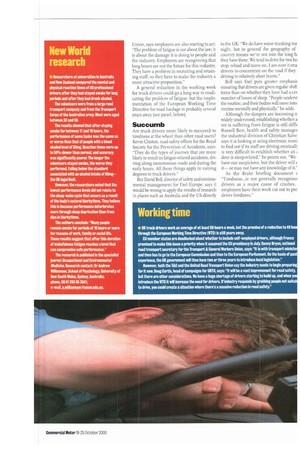New World research
Page 49

If you've noticed an error in this article please click here to report it so we can fix it.
4 Researchers at universities in Australia and New Zealand compared the mental and physical reaction times of 40 professional drivers after they had stayed awake for long periods and after they had drunk alcohol.
The volunteers were from a large road transport company and from the Transport Corps of the Australian army. Most were aged between 30 and 50.
The results showed that after staying awake for between 17 and 19 hours, the performance of some tasks was the same as or worse than that of people with a blood alcohol level of 50ing. Reaction times were up to 500o slower than normal, and accuracy was significantly poorer The longer the volunteers stayed awake, the worse they performed. falling below the standard associated with an alcohol intake of 80mgthe UK legal limit.
However, the researchers noted that the lowest performance levels did not relate to the sleep-wake cycle that occurs as a result of the body's natural biorhythms. They believe this is because performance deteriorates more through sleep deprivation than from dips in biorhythms.
The authors conclude: "Many people remain awake for periods of 16 hours or more for reasons of work, family or social life. These results suggest that after this duration of wakefulness fatigue reaches a level that can compromise safe performance."
The research is published in the specialist journal Occupational and Environmental Medicine. Research contact: Dr Andrew Williamson. School of Psychology, University of New South Wales, Sydney, Australia; phone, 00 61 293 85 3041: e-mail, amilliamson a unsw.edu.au.












































































































